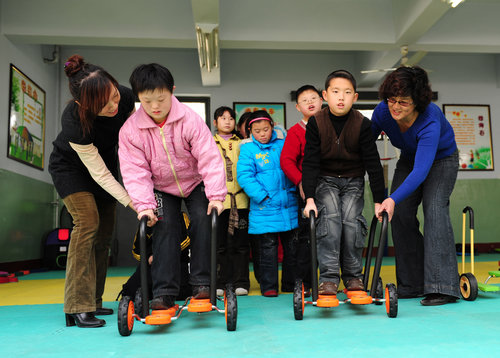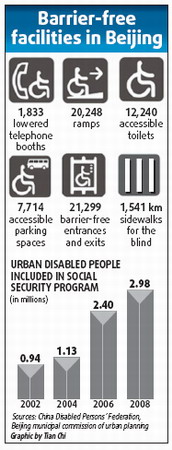Society
Going the extra mile for the disabled
By Lan Tian and Wang Qian (China Daily)
Updated: 2009-12-04 07:54
|

|
Although hosting the Beijing Olympics and Paralympics opened up the ancient capital to the disabled, Beijinger Guan Yan still feels inconvenienced when she leaves home.
The 37-year-old, who has been paralyzed from the waist down for 23 years, works as an English teacher at a distance-learning organization and also volunteers part time.
The subway and taxis have become her most frequent means of transportation since Beijing's underground network was expanded and the country's first barrier-free taxi fleet was put on Beijing roads last year.
"However, it's still inconvenient for me or my friends with disabilities to leave our homes," she told China Daily.
If she wants a taxi she has to book one several days in advance as the city only has 70 barrier-free taxis.
In a barrier-free cab, the driver's seat can rotate, making it easier for a disabled person to get in and out. It also offers more space in the back seat and provides easier access for loading wheelchairs.
"Such taxis have bigger interior spaces, and a ride in the barrier-free taxis costs 2 yuan (30 cents) per km, the same as an ordinary taxi so, some people without disabilities claim they are disabled when they book the taxi, but use it to carry a large amount of baggage or cargo," said Guan, who often hears such stories from drivers of barrier-free cabs.
There is also no guarantee that someone can successfully book a barrier-free taxi, depending on availability.
Taking the subway is not much easier.
Xie Zhanyuan, a 53-year-old retiree who has suffered from polio since childhood, said most wheelchair hoists at subway stations in the capital stopped operation after the Paralympics.
"It took almost an hour for my two friends in wheelchairs and me to take the wheelchair hoist at the subway," said Xie, who volunteered to check the city's barrier-free facilities along with another 61 citizens in Dongcheng district.

"Disabled people are encouraged to integrate into society, which is hard to do if we can't even get out of our homes without barriers," Guan said.
Since the United Nations in 1982 declared Dec 3 the International Day of Persons with Disabilities, the day has offered a chance to honor the contributions made by those with disabilities, but it also reminds people what still needs to be done.
"As a country with a large disabled population, China should do more to improve social security and social service for its people with disabilities," Cheng Kai, vice-president of the China Disabled Persons' Federation, said on Tuesday when releasing a monitoring report on the disabled.
Though there is still a long way to go in the eyes of many disabled people, authorities have been trying hard to improve their situation.
About 79 percent of disabled said their city or town has at least one kind of barrier-free facility, the monitoring report showed.
By April, the per capita disposable income of urban disabled increased by 1.1 percent to nearly 8,600 yuan year on year, and the number for rural disabled was up by 6.9 percent to 4,100 yuan, it showed.
The government also tries to offer better education and training for job skills. In November, the China Disabled Persons' Federation and the Ministry of Finance jointly earmarked 600 million yuan in three years to boost the building of a national system caring for the disabled.
Any poor families with members who have mental and severe physical disabilities can apply for aid if the disabled person is jobless and needs care.
About 5.5 million disabled people in the country were assisted last year thanks to government-funded programs, with 800,000 people receiving cataract operations and 35,000 with poor vision receiving visual aids, statistics from the disabled federation showed.












